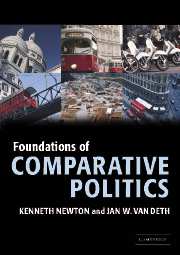Book contents
- Frontmatter
- Contents
- Acknowledgements
- List of briefings
- List of fact files
- List of controversies
- List of tables
- List of figures
- List of abbreviations and acronyms
- Key terms and concepts
- PART I The state: origins and development
- PART II The polity: structures and institutions
- PART III Citizens, elites and interest mediation
- PART IV Policies and performance
- Glossary of key terms
- Index of names
- Index of subjects
PART IV - Policies and performance
- Frontmatter
- Contents
- Acknowledgements
- List of briefings
- List of fact files
- List of controversies
- List of tables
- List of figures
- List of abbreviations and acronyms
- Key terms and concepts
- PART I The state: origins and development
- PART II The polity: structures and institutions
- PART III Citizens, elites and interest mediation
- PART IV Policies and performance
- Glossary of key terms
- Index of names
- Index of subjects
Summary
Most ordinary people are not very interested in political institutions and processes. What interests them about politics is what governments do to them and for them:
What do they get for their tax bill?
Do their children get a good education?
Is inflation and unemployment low?
Will they get a decent pension when they retire?
Are the streets safe?
Is their nation well protected from its enemies?
Part IV of the book, therefore, is about the policies and performance of governments. A ‘policy’ is a general set of ideas formulated into a plan that has been officially agreed, and which is used as a basis for making decisions. So when we speak of ‘economic policies’ we refer to the activities a government has planned to achieve its economic goals. Although ideas and plans are important, what most people care about is performance. By ‘performance’ we mean the actual results that governments get – is inflation low and economic growth good? Is crime under control? Are schools well staffed and equipped? Is hospital care effective? Plans are no good if they do not achieve their goals, and performance is no good if it is based on muddled or dangerous plans in the first place. Citizens want good plans and good performance together, but they care most about performance.
- Type
- Chapter
- Information
- Foundations of Comparative Politics , pp. 239 - 240Publisher: Cambridge University PressPrint publication year: 2005

